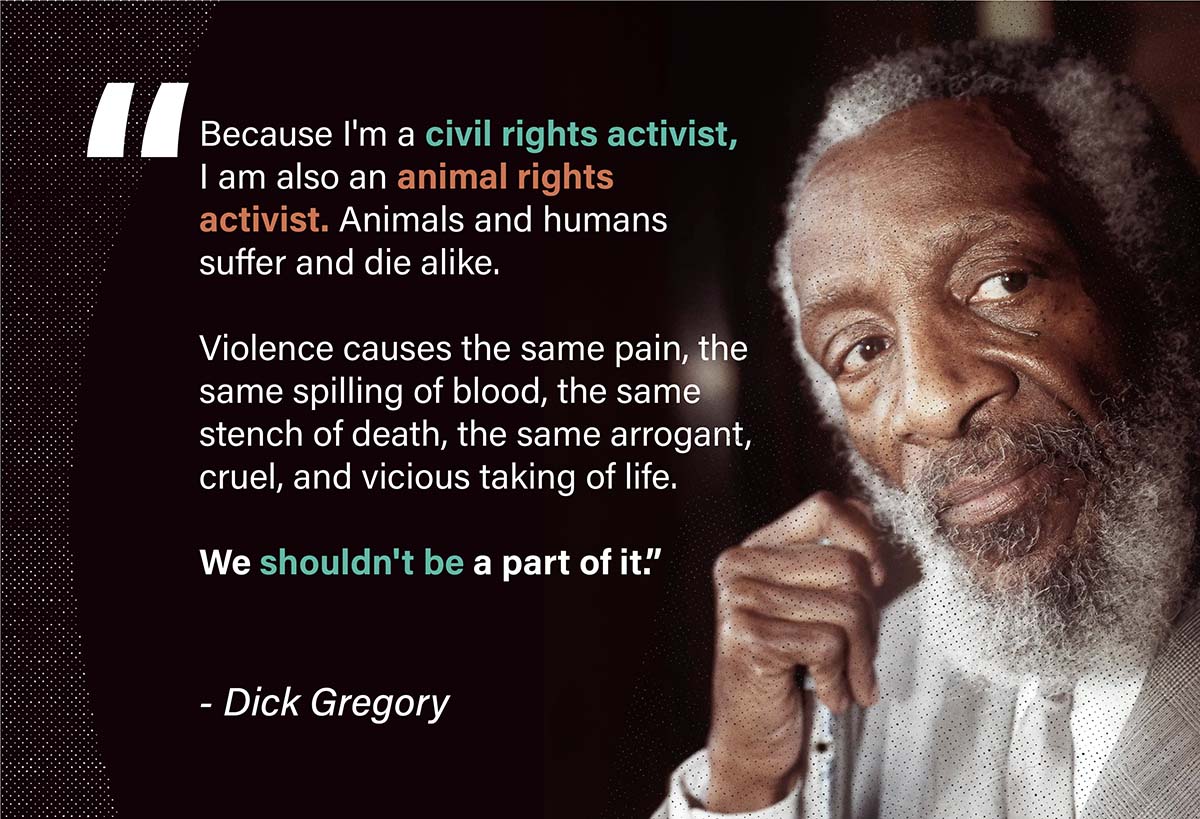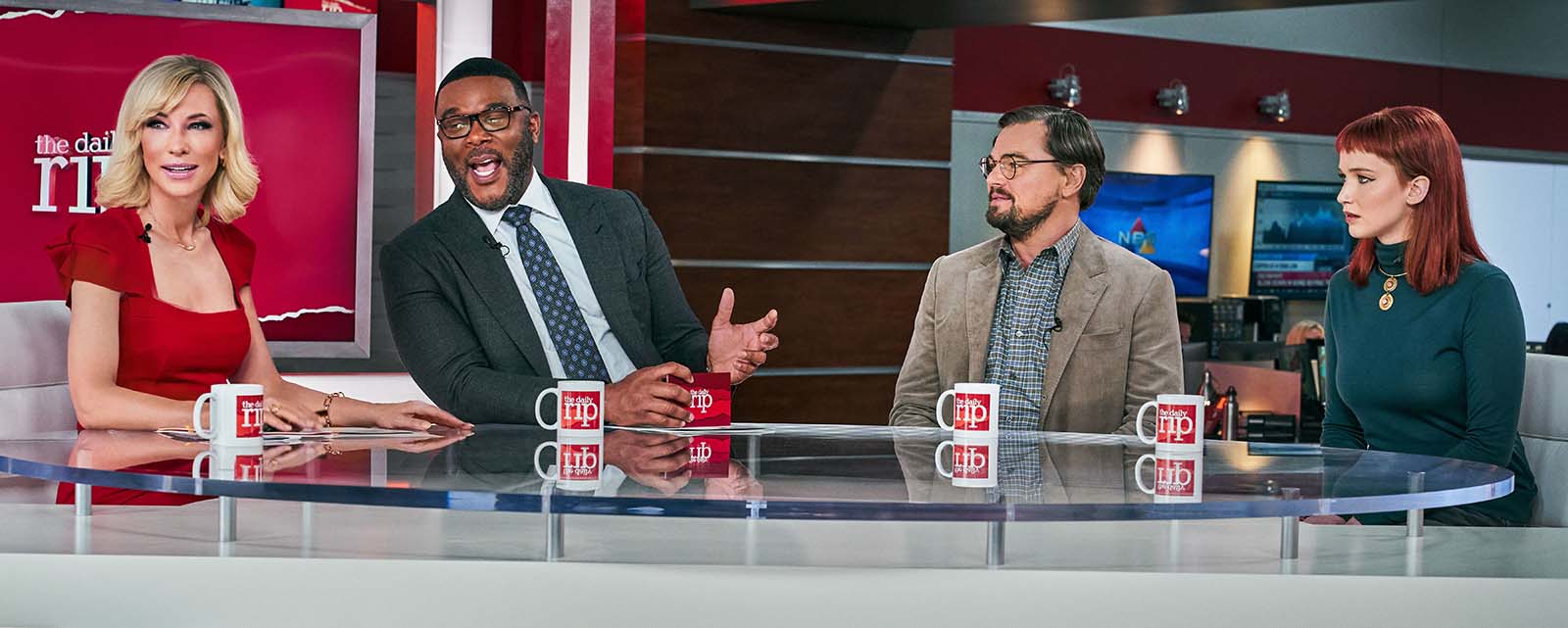Black Vegans (Part 3/9): Before 'Vegan' Became A Movement
The Lesser-Known Vegan Journeys of Civil Rights Leaders and Pioneers
This is (Part 3) of the publication "Black Vegans' Vision Of Total Liberation Poised To Shape Our Future
In the thick of the civil rights movement, leaders, deeply involved in their battle against systemic racism and oppression, began to draw parallels to the sufferings of animals in the food industry. The connection was profound, with leaders recognizing that the tools and systems used to oppress them also wield their oppression against animals.
Numerous Black civil rights activists eventually embraced veganism, understanding the interconnections between various forms of oppression. Angela Davis, Coretta Scott King, Dick Gregory, and many others turned to veganism as an extension of their commitment to justice, equality, and liberation for all beings.
The renowned activist Dick Gregory once noted, "Because I'm a civil rights activist, I am also an animal rights activist. Animals and humans suffer and die alike. Violence causes the same pain, the same spilling of blood, the same stench of death, the same arrogant, cruel and vicious taking of life. We shouldn't be a part of it." ― Dick Gregory

This statement not only underscores the depth of empathy shared by many Black leaders toward animals but also introduces a concept that some might find unfamiliar: intersectionality.
This parallelism wasn't just abstract; it had historical foundations. The "breeding" of enslaved people, an alarming aspect of the slave trade, bore striking similarities to treating animals in modern industrial farming. Enslavers, recognizing the economic benefits, forced unions between enslaved people to produce offspring. The forced reproduction ensured a continuous supply of enslaved individuals to fuel the system without needing external procurement. Similarly, cows undergo forced insemination in the dairy industry to ensure a constant supply of milk-producing offspring.
In their proximity to oppression, these leaders found an unsettling truth: when an oppressor seeks to dominate, they will employ those tactics against anyone or anything they deem inferior or subservient. The system, therefore, was not just racially prejudiced but inherently oppressive, blind to species, and deaf to the cries of both humans and animals.
The lens of feminism within the civil rights movement further exposed these parallels. As women's demand for equality and autonomy grew louder, some activists noticed an uncomfortable correlation between women's exploitation and female animals' exploitation in the food system. Female animals, such as dairy cows, are subjected to forced insemination, producing offspring against their will. These procedures aren't gentle requests or natural processes but deeply invasive actions without consent. Their offspring are promptly separated from their mothers to be fed into other channels of the system or discarded as waste byproducts with no monetary value to the industry.
In the egg industry, a similar harrowing fate awaits the newly hatched chicks. Immediately after birth, male chicks, having no value in egg production, are separated from their mothers and females. These innocent beings are routinely rounded up as part of a standard industry practice—not an exception—and dumped into grinders while still alive. The rationale? They can't lay eggs, and they're not the breed grown for meat. Thus, in the eyes of the industry, their brief lives are ended in moments of unrelenting cruelty.
In the dairy and egg industry, female animals are trapped in a cycle of production and exploitation. Their existence is narrowly defined by their capacity to reproduce. When their bodies are exhausted, reaching their limit, and can no longer reproduce, they are deemed "spent" or without value. At that point, they meet a grim end. Such practices underscore a chilling resonance with the historical and ongoing exploitation of women, where value is measured by utility or reproductive potential. This alignment of systemic oppression across species and genders is not just profoundly unsettling but beyond cruel.
For many leaders, while the bulk of their advocacy centered on the immediate and palpable human oppression they faced daily, their personal choices reflected a broader understanding of interconnected oppressions. While figures like Angela Davis may not have been on the frontlines for animal rights during the heights of their civil rights advocacy, their evolution in understanding and vocalizing the importance of animal liberation, as Davis herself believes, highlights its significance as a pivotal revolutionary movement Today.
In an interview, Angela Davis expressed, "I'm sometimes really disappointed that many of us can assume that we are these radical activists, but we don't know how to reflect on the food that we put in our own bodies. We don't realize the extent to which we are implicated in the whole process of capitalism by participating uncritically in the food politics offered us by the great corporations."
|
Then, in a moment that resembled a great exhale, she confessed, "You know, I usually don't mention that I'm vegan. But that has evolved. I think it's the right moment to talk about it because it is, I think, a part of a revolutionary perspective. How can we not only discover more compassionate relations with human beings? But how can we develop compassionate relations with the other creatures with whom we share this planet? And that would mean challenging the whole capitalist industrial form of food production." |
Davis continues, "And I think that the lack of critical engagement with the food that we eat demonstrates the extent to which the commodity form has become the primary way in which we perceive the world... And so I think that would really be revolutionary, to develop a kind of repertoire, a habit of imagining the relations, the human relations, and the non-human relations, behind all of the objects that constitute our environment."
|
In an interview, the iconic Cicely Tyson candidly shared her deeply personal journey towards vegetarianism, linking it with a pivotal historical moment. She said, "When Martin Luther King was assassinated, I was so stunned by that that I became a vegetarian, and I've been that most of my life." |
The weight of that revelation — connecting her dietary choices to the shock of a monumental tragedy — speaks volumes about the intricate weave of personal and societal experiences that influence our decisions. However, in what felt like a scene directly lifted from the satirical film 'Don't Look Up,' the host's response was a bewilderingly trivial "Wow, vegetables, vegetables," before abruptly and awkwardly cutting to a commercial break. Their reaction reduced her profound testimony to a mere commentary on greens, bypassing the depth and gravity of what she'd just unveiled.
The oversight, perhaps unintentional, denied us all a chance to delve deeper into the psyche of an individual grappling with the weight of racial injustice and its ripple effects on personal choices. Despite rigorous searches, I've found no additional interviews, writings, or insights that shed light on the intricacies of Tyson's sentiments. And so, her profound revelation remains an enigma (to me), a glimmer of insight into the deep depths to which the devastating impacts of oppression can shape individual paths.

Scene from the movie 'Don't Look Up'
Continue Reading The Full Publication: "Black Vegans' Vision Of Total Liberation Poised To Shape Our Future."
This is (Part 3) of the above series - All posts in the series can be read here: Black Vegan Blog Series